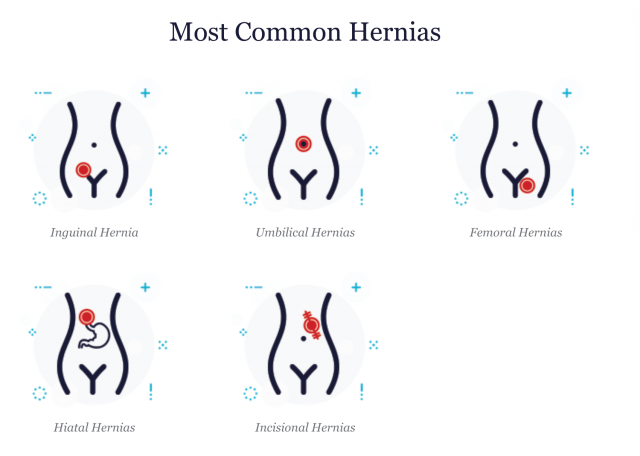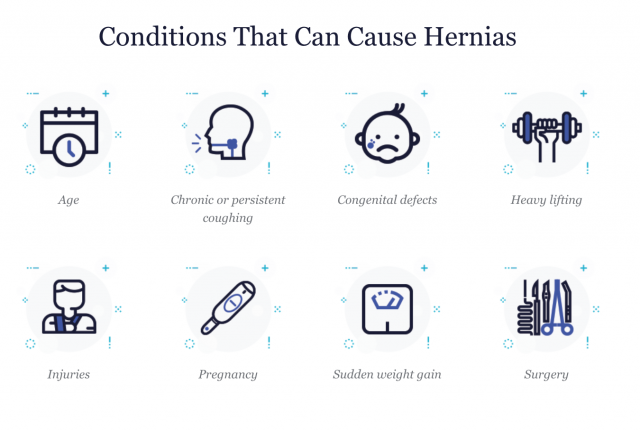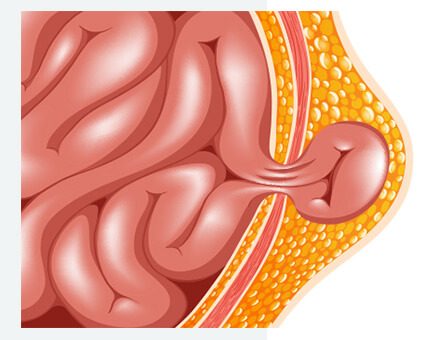Hernias
A hernia is when tissue or part of an organ bulges through a tear or weak spot in the body. Heavy lifting, chronic coughing and sudden weight gain contribute to their development. Hernia symptoms typically include abdominal, pelvic or testicular pain. Diagnosis is through a physical exam. Treatment includes lifestyle changes and surgery for a permanent repair.
What Is a Hernia?
Hernias occur when tissue or internal organs slip through tears or weak spots in tissue walls. There are several types of hernia, including inguinal, femoral, umbilical and incisional. In an inguinal hernia, tissue or the intestines slip through the abdominal wall near the groin; it is the most common hernia type. Femoral hernias occur in the upper thigh, umbilical hernias involve the navel and incisional hernias develop in surgical incisions.
Although some people may not experience any hernia symptoms, they can be quite painful. Symptoms often include pain in the affected area that is exacerbated by coughing or straining. Many patients also notice a small tissue bulge when a hernia develops.
Individuals who suspect a hernia should seek medical attention as soon as possible. Doctors can usually diagnose hernias through a physical exam. Treatment typically involves symptom management and changing behaviors to limit irritation of the area. Surgery is the only way to permanently correct the defect that causes a hernia. Hernia repair is among the most common types of surgery performed in the U.S., with over 1 million performed each year. The vast majority of those use hernia mesh.
Common Hernia Types
The majority of hernia cases are inguinal, umbilical or hiatal. Other types, such as femoral and incisional, are less common.

Inguinal hernias occur in the groin region. The most common type of hernia, inguinal hernias occur more frequently in men than women but can affect anyone. There are two subcategories of hernias within the inguinal type: direct and indirect. A direct inguinal hernia pushes directly through a weak spot in the posterior wall of the inguinal canal (Hesselbach’s triangle). In contrast, an indirect hernia originates deeper at the internal inguinal ring and then follows the inguinal canal (an “indirect” route).
If left untreated, inguinal hernias can become incarcerated, or stuck outside of the abdominal cavity. This can lead to a loss of blood flow to the hernia contents, which is known as strangulation. It is very important to have inguinal hernias diagnosed and treated promptly to avoid this progression.
Umbilical hernias occur around the navel, most commonly in babies, when the tissue around the umbilicus does not fully close. They are often painless, with the only symptom being a raised area around the navel that bulges when a baby strains. Umbilical hernias often resolve on their own before children reach the age of four. However, adults should seek immediate medical attention for umbilical hernias to ensure there are no complications.
Hiatal hernias occur when the top of the stomach pushes through an opening in the diaphragm called the esophageal hiatus. This can lead to pain, discomfort and acid reflux symptoms. The risk of developing a hiatal hernia increases with age, with them being most common in adults over 50.
Incisional hernias occur in a surgical incision, usually within a few months after surgery. Patients suspecting an incisional hernia should discuss their symptoms and concerns with their surgeon.
Causes of Hernias
Muscle and connective tissue defects are the most common causes of hernias. Most people develop tissue weaknesses as they age; however, some people are born with weak connective tissue. This may be explained by genetic factors leading to impaired collagen metabolism. Surgery and certain medical conditions can also contribute to muscle and tissue weakness.
- Male sex
- A family history of inguinal hernia in first-degree relatives
- Conditions that lead to impaired collagen metabolism
- Prostate surgery, especially if open
Other factors that may contribute to the development of a hernia include excess weight, lifting heavy objects, and in the case of incisional hernias, smoking, which delays incision healing. However, the role of these factors is unclear.

Recognizing Hernia Symptoms
The most common symptoms include pain and a noticeable bulge in the affected area. Hernia symptoms can vary, and some people do not experience any. Specific symptoms may depend on the type of hernia.
- Pain or burning sensation near a bulging area in the abdomen
- A heavy or dragging feeling in the groin or around the testicles
- Unusual pain or discomfort in the groin, especially when straining or lifting heavy objects
Internal or hiatal hernias may also produce heartburn or indigestion. This is because the normal pressure that prevents stomach acid from backing up into the esophagus is lost. The acid buildup causes the symptoms of GERD (gastroesophageal reflux diseases).
While hernia symptoms are often mild, some are cause for concern. Hernia patients who experience sudden intense pain, nausea or digestive issues, difficult bowel movements or a hernia bulge that turns red or feels firm or tender should seek immediate medical attention. These could be signs of a trapped hernia, which can lead to strangulation.

Hernia Treatment Options
Patients can live with a hernia without any serious symptoms for many years. At first, many patients opt for a conservative management that includes monitoring and minor interventions like “reducing” the hernia (pushing it back in). It also includes lifestyle changes and medications to manage pain and other symptoms. For example, some doctors prescribe proton pump inhibitors to reduce stomach acid. For many, this is sufficient and they need no further treatment.
Some patients whose hernias worsen or interfere with daily activities will opt for surgical treatment. Hernia surgery is the only permanent treatment for the condition. During surgery, doctors close tears and reinforce weak spots, often using a mesh for a long-term solution. Broadly speaking, there are two main types of hernia surgery: open and laparoscopic. The latter is a minimally invasive procedure that has fewer potential complications.
Understanding Hernia Mesh Surgery
Most hernia repair surgeries utilize a hernia mesh to reinforce the torn or weakened area. Mesh is a synthetic path that covers the tear. It provides support to the damaged tissue and acts as a scaffold for new tissue growth.
Doctors can also use a pure tissue repair, suturing the damaged tissue to close it. This can involve multiple layers of tissue for strength. Pure tissue repairs are less common than those using hernia mesh, but they remain a suitable option for certain types of hernias.
The use of mesh appears to reduce hernia recurrence after surgical repair. One review of available data showed that in the study population, mesh surgery reduced the incidence of recurrence and certain complications.
Hernia mesh surgery is a very common procedure. Most patients recover in a few days, although a full recovery can take a few weeks, which is related to the amount of time it takes for the tissue to regain its strength. It’s important to follow the advice of the surgeon performing the hernia repair for the best postoperative results.
Complications and Considerations
Complications from hernias include incarceration (entrapment) and strangulation. Incarceration means the hernia sac cannot be pushed back into the abdomen. This can lead to strangulation, which compromises blood flow to the herniated tissue. Strangulation is a serious complication that requires emergency intervention. Anyone experiencing a sudden change in symptoms should seek immediate medical attention to avoid long-term tissue damage.
There are also complications associated with hernia surgery. Recurrence is a common complication, but its likelihood is lower with the use of hernia mesh. Other potential complications include bowel obstruction, infections and mesh adhesion to neighboring tissue.
Some patients have severe reactions to hernia mesh. Additionally, there is a risk of mesh failure, which can cause its own set of complications. Affected patients have filed hernia mesh lawsuits seeking compensation.
Calling this number connects you with a Drugwatch.com representative. We will direct you to one of our trusted legal partners for a free case review.
Drugwatch.com's trusted legal partners support the organization's mission to keep people safe from dangerous drugs and medical devices. For more information, visit our partners page.

